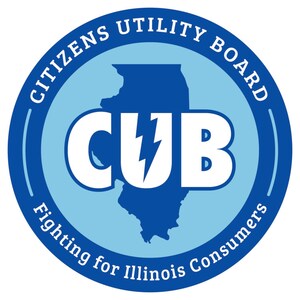CUB REPORT: COMPREHENSIVE STATE-BY-STATE RANKINGS ON UTILITY PERFORMANCE CAST DOUBT ON CLAIMS THAT FOSSIL FUELS LOWER POWER BILLS
Nevada Ranks Best, West Virginia Worst in Consumer Watchdog's First-ever Nationwide Assessment of the Cost, Reliability and Environmental Impact of Electricity Service; No Evidence Found to Support Industry Claims that Coal, Natural Gas More Affordable and Reliable for Consumers
CHICAGO, Feb. 15, 2022 /PRNewswire/ -- While officials in the fossil fuel industry have long insisted that investments in coal and natural gas are necessary to keep electricity bills low and the lights on, a consumer watchdog group on Tuesday said that its first-ever analysis of state-by-state energy data casts doubt on those claims.
In fact, Electric Utility Performance: A State-By-State Data Review shows that consumers appear to pay higher bills and spend a higher percentage of their income on electricity in many of the same U.S. states where fossil fuels account for the largest share of the power mix. Similarly, states that rely heavily on fossil fuels also tend to rank relatively low on reliability.
The relationship between the cost and environmental ramifications of electricity is one of a litany of findings in the state-by-state ranking of overall utility performance, conducted under the auspices of the Citizens Utility Board (CUB), a nonprofit consumer advocate based in Illinois.
Analyzing data that utilities are required to file with the federal government, the report evaluates state rankings in three key areas: affordability, reliability and the environmental impact of electric service. It then averaged the rankings in these categories to yield a cumulative best-to-worst value of utility performance for all 50 U.S. states and the District of Columbia.
Nevada captured the top spot for utility performance, with an average ranking of 13.6 across the three categories. West Virginia was at the bottom, with a corresponding mark about three times higher at 39.3. The study's data were collected and published by the Energy Information Administration (EIA) of the U.S. Department of Energy, the U.S. Environmental Protection Agency (EPA) and the U.S. Census Bureau. Most figures are from 2019 because of a time lag in reporting on the part of utilities.
"In assessing how well our nation's utilities perform, we evaluated them from the perspective of the consumers they serve and the public resources they're entrusted with safeguarding," CUB Executive Director David Kolata said. "Ultimately, we believe the quality of our electric service hinges on three key objectives: It should be affordable, reliable and clean."
While the report can serve as a helpful guide for states ranking poorly in various categories, Kolata said that states performing well shouldn't regard these positive metrics as a license to coast. There is ample room for even the top-performers to improve, and further benefit their customers.
Kolata noted that the report comes at a pivotal time for the U.S, as evidence of the changing climate jolts the country with increasing frequency, from winter deep freezes, to spring and summer floods and wildfires, to autumn hurricanes. The United Nations' Intergovernmental Panel on Climate Change declared last year that the U.S. and the globe were at a crossroads in efforts to avert the most devastating
impacts of carbon emissions unleashed by fossil fuels. As one of the country's largest sources of the carbon emissions that cause climate change, electric utilities loom large in the ability to keep these threats in check.
Meanwhile, technological innovation, combined with cultural sea changes such as the working-from-home revolution spurred by the coronavirus pandemic, have put even more demand on our electric infrastructure and underscore the critical importance of an affordable and reliable power supply.
"Arguably, it's never been more important to understand how our electric utilities are performing – and what can be done to optimize the delivery of their services – than now," Kolata said. "Our security, our economy, and the viability of our environment are all dependent on the quality of this vital resource."
The report yielded other findings that warrant further review by policymakers, the authors said. Among them:
- Lower electricity rates are not necessarily synonymous with lower electricity bills for consumers. In fact, several states with some of the lowest per-unit power costs actually are among those with the highest average residential bills. This seeming paradox can be attributed in part to differences in weather, but it also reflects the money-saving benefits of investments in cost-effective energy efficiency and clean energy programs. Those expenditures may lead to increases in the nominal electric rate a utility charges, but by reducing the amount of actual power consumed, they can shrink overall costs for consumers over time.
- Not all states that installed so-called smart-grid infrastructure ranked well in the reliability of electric service. Michigan, Ohio, and Oklahoma each spent large sums on grid modernization yet floundered on reliability, suggesting that the introduction of technologies such as Advanced Metering Infrastructure needs to be coupled with vigilant oversight by regulators and consumer advocates.
Kolata said CUB intends to conduct further research to probe deeper into the relationships between the data in the report, and he urged federal and state policymakers to launch similar reviews.
"We hope this report sparks discussion and then action on how states can achieve the cheapest, fastest path to 100 percent clean, affordable power," Kolata said.
CUB is Illinois' leading nonprofit utility watchdog. Created by the Illinois Legislature, CUB opened its doors in 1984 to represent the interests of residential and small-business utility customers. Since then, it has saved consumers more than $20 billion by helping block rate hikes, secure refunds, and fight for clean, low-cost energy. For more information, call CUB's Consumer Hotline, 1-800-669-5556, or visit its award-winning website, www.CitizensUtilityBoard.org.
SOURCE Citizens Utility Board

WANT YOUR COMPANY'S NEWS FEATURED ON PRNEWSWIRE.COM?
Newsrooms &
Influencers
Digital Media
Outlets
Journalists
Opted In





Share this article